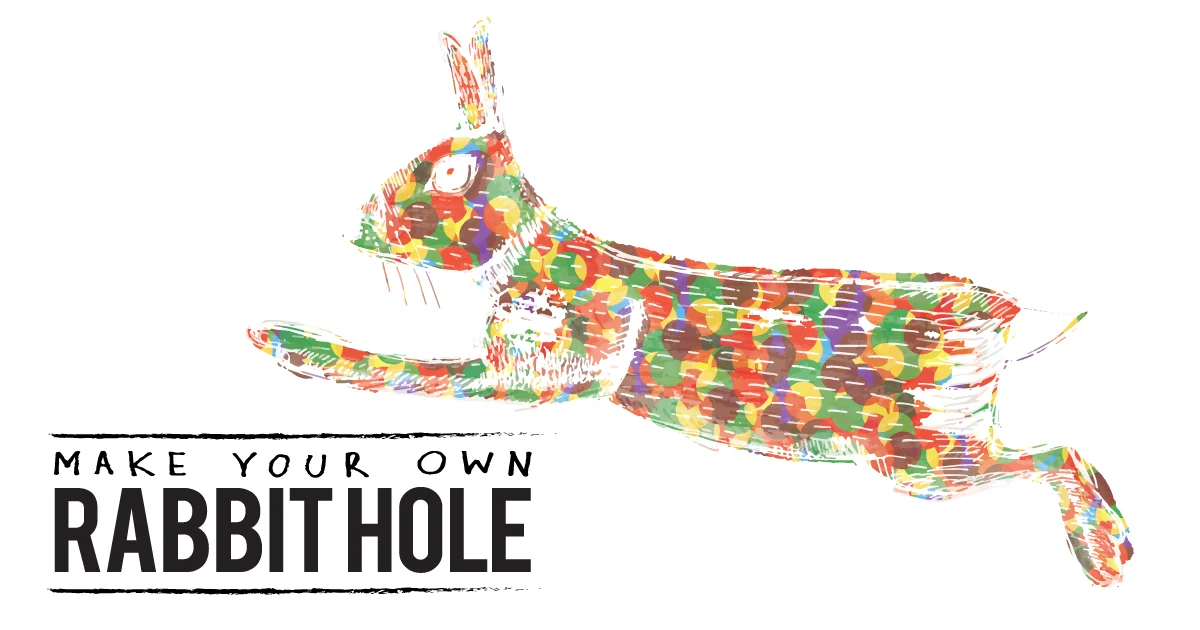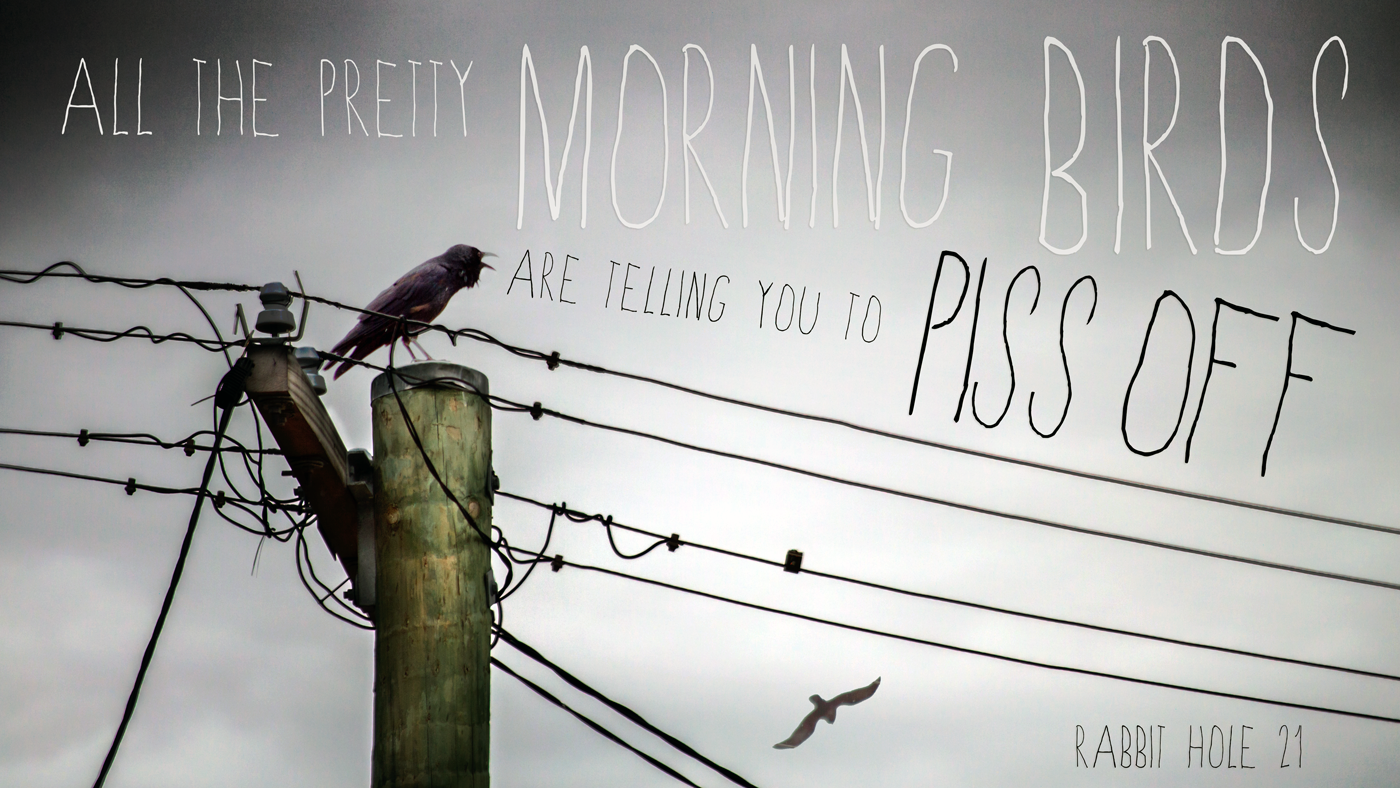All the pretty morning birds are telling you to PISS OFF!
/Dawn’s glorious birdsong—well, in Australia, ‘glorious’? Not so much.
One Sunday morning I woke up super early. What would later be bruising sunlight was already getting pushy around the edges of the curtains—like a great mass of shoppers waiting impatiently for the doors to open on the post-Christmas sales. But with the curtains drawn it was still semi-dark, and I was just lying there listening to the world as it slowly woke up. Mostly, all I could hear was the sound of birds talking to each other.
I tried to imagine what they were saying. They all seemed to be talking at once, but after a short time I started to hear individuals in the crowd. I could distinguish one bird yelling to another over a long distance, and then another further away piping in, and as I lay there the title for this essay popped into my head:
All the pretty morning birds are telling you to piss off.
The English poet Gerard Manley Hopkins had this poem about woodlarks that mimicked their song, going:
With a sweet joy of a sweet joy
Sweet, of a sweet, of a sweet joy
Of a sweet—a sweet—sweet—joy (“Woodlark,” 1918)
Having lived in England for a short time, I could relate to the cleverness of Hopkins’ imitation. Whereas right at that moment, lying in bed, the only sonorous 'joy' I could hear was a bird going:
Faaaaarrrrrrrrrrk!
FaaAAAAaarrrrrrrrrrK!
More than a century before Hopkins wrote “Woodlark,” Samuel Taylor Coleridgein “The Nightingale” (1798) warned us to be careful not to superimpose our thoughts and feelings onto nature.
At the start of his poem, Coleridge is sitting on a bridge with some friends, marveling at the cloudless, clear sky and the river moving silently beneath them:
No cloud, no relique of the sunken day
Distinguishes the West, no long thin slip
Of sullen light, no obscure trembling hues.
Come, we will rest on this old mossy bridge!
You see the glimmer of the stream beneath,
But hear no murmuring: it flows silently,
O’er its soft bed of verdure. All is still,
As readers, we sit with Coleridge and his friends on the bridge, feet dangling in the cool air, reveling in the world, and then suddenly a song starts up out of the silence:
And hark! the Nightingale begins its song,
“Most musical, most melancholy” bird!
But then Coleridge catches himself, and shakes the idea from his head:
A melancholy bird! Oh! idle thought!
In nature there is nothing melancholy.
But some night-wandering man whose heart was pierced
With the remembrance of a grievous wrong,
Or slow distemper, or neglected love,
(And so, poor wretch! filled all things with himself,
And made all gentle sounds tell back the tale
Of his own sorrow) he, and such as he,
First named these notes a melancholy strain.
And so Coleridge dismisses the whole notion of anthropomorphising nature, explaining that oftentimes we don’t hear or see at all, but ‘tell ourselves back the tale’ of what resides within us; not what’s right there in front of us, without.
And so Coleridge’s “The Nightingale” is basically an 18th Century smack-down to all those poets who ignored what they’re actually experiencing, or aped the cliché of the nightingale’s ‘melancholic’ song. (Actually, the slight is directed at Milton who Coleridge quotes in the line, “Most musical, most melancholy bird!”)
It’s just like Anaïs Nin said,
“We don’t see things as they are; we see things as we are.”
For us in Australia, it’s a lot easier not to get caught up in the romanticism of nature because a lot of our wildlife is pretty gnarly, spiny and more often than not most definitely un-cuddly—including Koalas who look cute but are drunk on gum leaves and make a horrible racket when they’re disturbed.
And our birds don’t sound like they’re singing of ‘a sweet, of a sweet, of a sweet, sweet joy.’ In this country, the dawn chorus is a caterwauling, catcalling cacophony—basically a bunch of different bird species doing what 18 year-olds in souped-up cars do on a Saturday night, yelling at pedestrians:
Woo! Haybaybe! Yearrrh! Haydikhed! Getacaaaarrrr!
In my mind, Australian birds resist our fantasies because they in no way inspire that European sense of prettiness or solitary sadness. When I listen, all I hear is how we speak sometimes, even to the point where crows sound like they’re saying “MaaaaAAte! MaaaaaaaAAte!”
Of course this might be stretching things a little—an effect of my own ‘telling back the tale’—but there’s evidence that says Australian birdsong is particularly aggressive compared to other bird-life the world over. According to naturalist Tim Low, Australian birds are pretty combative, and are basically telling us and each other to “shove off.”
Low argues that a lot of racket is a battle over sugar. In this country, there are a lot of trees that produce nectar all year round, and most of the shouting and screeching is birds protecting their territory, and their right to control this precious resource. In a radio interview Low explains that, for Australian birds:
“You don’t need to be clever to find that food, you just need to be bombastic to maintain control. And so we have these massive fights and squabbles and feuds coming and going out of the flowering trees.”
And then there are all warning calls to each other of approaching predators, or signalling to potential mates, internal squabbles, and a whole bunch of other sounds.
Hello, bonjour, guten tag, etcheet quorrrr
But it’s not all sex and aggression, and wailing and shrillness. I read this paper that said they think that Australian magpies mimic the calls of other birds and improvise their own tunes for no other reason than to be social.
F. Norman Robinson explains that, in “marked contrast to their breeding behaviour when family groups defend territories by aggressive visual and vocal displays restricted to specific informative signals,” moulting adolescent male magpies sing to each other and the rest of their group so that they can have “social contact without expressing alarm, aggression or courtship” (62).
When D.H. Lawrence visited Australia, he was amazed by our magpies. Writing about his experiences in Kangaroo, Lawrence said that one of the “charms of Australia” was that “the birds are not really afraid, and one can really communicate with them” and they seemed “really to listen.”
"In West Australia [one] could sit in the bush and talk to the flocks of big, handsome, black-and-white birds that they call magpies, but which are a sort of butcher bird, apparently. And they would gurgle little answers in their throats, and cock their heads on one side. Handsome birds they were, some with mottled grey breasts like fish. And the boldest would even come and take pieces of bread from his hands. Yet they were quite wild. Only they seemed to have a strange power of understanding the human psyche."
Which might be Lawrence ‘telling the tale back to himself,’ but then again magpies do seem to listen sometimes.
I’m currently writing an application for a grant for online writing, and part of the application is pitching an idea for a year’s worth of posts. The process has made me wonder what it is exactly that I’m doing with this blog, and just writing this essay about birds has made me realise two keys to the puzzle.
The first piece of the puzzle is that I've been using Rabbit Hole to rehabilitate myself so I can go back to writing my thesis. I think I was telling myself back some tale and didn't realise it or didn't want to listen. And it's things like that, which create the conditions for writer’s block to hit you in the head.
The second piece is that my experience of academic writing so far makes me feel like it’s so sheltered and proscribed, and writing that stuff that only three or four people will read is lonely work.
I think one of the reasons for writing this blog is that it’s my way of connecting with other writers and artists of all species. Like a teenage magpie, it’s my way of saying without expressing alarm, aggression or courtship,
Etcheet qurror, qurror, lorral, lorral, lorral...
Hey, I’m over here. How you doing? MaaaaAAte!
Rabbit













Painter Tracey Read talks about spending four weeks painting and drawing her way around Italy.